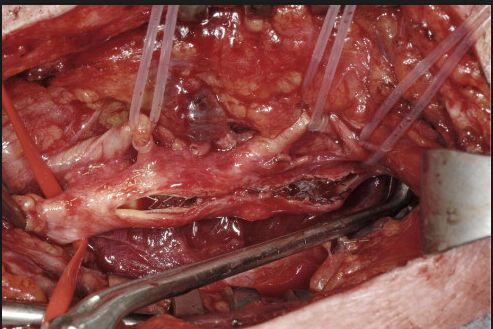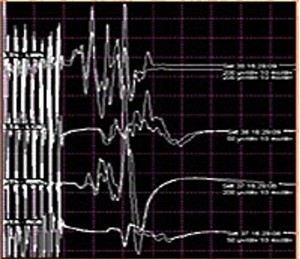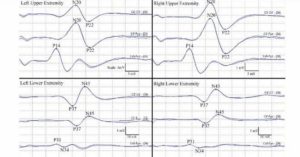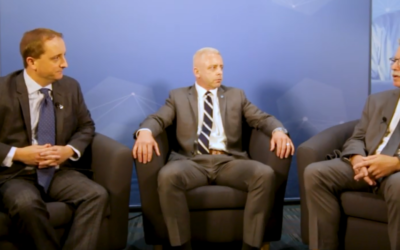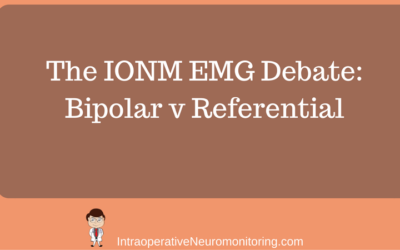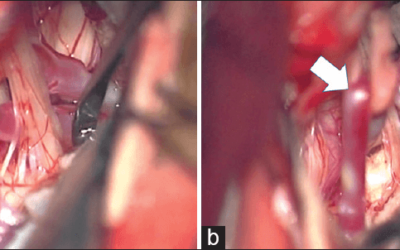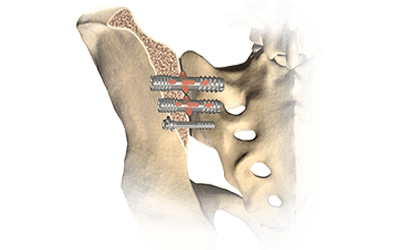A Request From A Reader… Create a Presentation For Neuromonitoring Carotid Endarterectomy Procedures
I had an email from a colleague looking for some info for neuromonitoring carotid endarterectomy procedures. I decided to go ahead and make a slideshow presentation, which is taking a little longer than expected. So that’s going to have to wait for my next post.
In this post, I wanted to go over a little bit of our conversation, which I think might help some others trying to decide what type of neuromonitoring to do for CEA.
Here’s the email…
|
(+)
tcMEP For CEA surgeries???
Here’s what my reply to her was…
Right off the bat, I’ll just let you know that SSEP and MEP might not be the best proposal to vascular surgeons. EEG is the standard of care, which means if you’re doing neuromonitoring on carotids, you better be running EEG. Most of them will know this, so you don’t want to lose credibility.
There are plenty of studies that show SSEP are probably as sensitive as EEG to ischemia, and since it can monitor deep brain structures, it serves as an excellent pairing with EEG.
MEPs, on the other hand, may not be the best monitoring modality of choice. In carotids, you’re looking mainly for cortical ischemia (though deep brain structures are at risk as well). MEPs have been shown to not just stimulate the cortex, but as far down as the medulla/cervical spine areas (which are not supplied by the MCA).
That means that MEP might still be present, even if there is ischemia in the frontal lobes. That’s a problem. Giving a false negative is probably the worst thing we can do in the OR. Those are the one’s that leave the patient injured and the IOM professional sued. No monitoring is better than bad monitoring.
Now, I’ve seen studies that are using MEPs for carotid endarterectomy procedures. And if you add that to the fact that you would be using TIVA protocol, you could argue that being in burst suppression is neuoprotective. Slower metabolic demand, lower oxygen needs.
Plus, SSEPs would still work nicely. But like I explained in the email, I just don’t think we can rely on MEP as much as EEG for ischemic changes to the cortical structures supplied by the middle cerebral artery after clamping the carotid artery. Oh, muscle relaxants would also be a no-no, so now the surgeon has to worry about the patient moving. Not the best scenario with blood vessels, nerves and esophagus all hanging out in that area.
In a later email, we agreed that EEG/SSEP would be a protocol that would work for them, and I’d try to help out with getting some information to present to the surgeons. But that’s only half way done, so it’s going to have to wait.
For those not familiar with the surgery itself, here’s a nice write up on outcomes of carotid endarterectomies…
Carotid Endarterectomy: experience in 8743 cases. by alexandre884
And here’s a video of the procedure…
Keep Learning
Here are some related guides and posts that you might enjoy next.
How To Have Deep Dive Neuromonitoring Conversations That Pays Off…
How To Have A Neuromonitoring Discussion One of the reasons for starting this website was to make sure I was part of the neuromonitoring conversation. It was a decision I made early in my career... and I'm glad I did. Hearing the different perspectives and experiences...
Intraoperative EMG: Referential or Bipolar?
Recording Electrodes For EMG in the Operating Room: Referential or Bipolar? If your IONM manager walked into the OR in the middle of your case, took a look at your intraoperative EMG traces and started questioning your setup, could you defend yourself? I try to do...
BAER During MVD Surgery: A New Protocol?
BAER (Brainstem Auditory Evoked Potentials) During Microvascular Decompression Surgery You might remember when I was complaining about using ABR in the operating room and how to adjust the click polarity to help obtain a more reliable BAER. But my first gripe, having...
Bye-Bye Neuromonitoring Forum
Goodbye To The Neuromonitoring Forum One area of the website that I thought had the most potential to be an asset for the IONM community was the neuromonitoring forum. But it has been several months now and it is still a complete ghost town. I'm honestly not too...
EMG Nerve Monitoring During Minimally Invasive Fusion of the Sacroiliac Joint
Minimally Invasive Fusion of the Sacroiliac Joint Using EMG Nerve Monitoring EMG nerve monitoring in lumbar surgery makes up a large percentage of cases monitored every year. Using EMG nerve monitoring during SI joint fusions seems to be less utilized, even though the...
Physical Exam Scope Of Practice For The Surgical Neurophysiologist
SNP's Performing A Physical Exam: Who Should Do It And Who Shouldn't... Before any case is monitored, all pertinent patient history, signs, symptoms, physical exam findings and diagnostics should be gathered, documented and relayed to any oversight physician that may...

